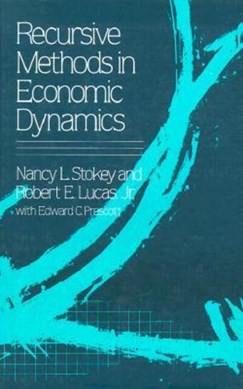-
BROWSE 1000s OF BOOKS IN STOCK
-
FREE DELIVERY ON ORDERS OVER €10
Recursive methods in economic dynamics
Hardback
Categories:
Economics
Three eminent economists provide in this book a rigorous, self-contained treatment of modern economic dynamics. Nancy L. Stokey, Robert E. Lucas, Jr., and Edward C. Prescott develop the basic methods of recursive analysis and emphasize the many areas where they can usefully be applied. After presenting an overview of the recursive approach, the authors develop economic applications for deterministic dynamic programming and the stability theory of first-order difference equations. They then treat stochastic dynamic programming and the convergence theory of discrete-time Markov processes, illustrating each with additional economic applications. They also derive a strong law of large numbers for Markov processes. Finally, they present the two fundamental theorems of welfare economics and show how to apply the methods developed earlier to general equilibrium systems. The authors go on to apply their methods to many areas of economics. Models of firm and industry investment, household consumption behavior, long-run growth, capital accumulation, job search, job matching, inventory behavior, asset pricing, and money demand are among those they use to show how predictions can be made about individual and social behavior. Researchers and graduate students in many areas of economics, both theoretical and applied, will find this book essential.
€131.88

395 Reward Points
In stock online
Extended Range: Delivery in 2-3 working days
Extended Range: Delivery in 2-3 working days
Free Delivery on this item
Any purchases for more than €10 are eligible for free delivery anywhere in the UK or Ireland!
Three eminent economists provide in this book a rigorous, self-contained treatment of modern economic dynamics. Nancy L. Stokey, Robert E. Lucas, Jr., and Edward C. Prescott develop the basic methods of recursive analysis and emphasize the many areas where they can usefully be applied. After presenting an overview of the recursive approach, the authors develop economic applications for deterministic dynamic programming and the stability theory of first-order difference equations. They then treat stochastic dynamic programming and the convergence theory of discrete-time Markov processes, illustrating each with additional economic applications. They also derive a strong law of large numbers for Markov processes. Finally, they present the two fundamental theorems of welfare economics and show how to apply the methods developed earlier to general equilibrium systems. The authors go on to apply their methods to many areas of economics. Models of firm and industry investment, household consumption behavior, long-run growth, capital accumulation, job search, job matching, inventory behavior, asset pricing, and money demand are among those they use to show how predictions can be made about individual and social behavior. Researchers and graduate students in many areas of economics, both theoretical and applied, will find this book essential.

395 Reward Points
Any purchases for more than €10 are eligible for free delivery anywhere in the UK or Ireland!
€131.88

395 Reward Points
Any purchases for more than €10 are eligible for free delivery anywhere in the UK or Ireland!
Categories:
Economics
Product Description
Three eminent economists provide in this book a rigorous, self-contained treatment of modern economic dynamics. Nancy L. Stokey, Robert E. Lucas, Jr., and Edward C. Prescott develop the basic methods of recursive analysis and emphasize the many areas where they can usefully be applied. After presenting an overview of the recursive approach, the authors develop economic applications for deterministic dynamic programming and the stability theory of first-order difference equations. They then treat stochastic dynamic programming and the convergence theory of discrete-time Markov processes, illustrating each with additional economic applications. They also derive a strong law of large numbers for Markov processes. Finally, they present the two fundamental theorems of welfare economics and show how to apply the methods developed earlier to general equilibrium systems. The authors go on to apply their methods to many areas of economics. Models of firm and industry investment, household consumption behavior, long-run growth, capital accumulation, job search, job matching, inventory behavior, asset pricing, and money demand are among those they use to show how predictions can be made about individual and social behavior. Researchers and graduate students in many areas of economics, both theoretical and applied, will find this book essential.
Product Details
ISBN9780674750968
FormatHardback
PublisherHARVARD UNIVERSITY PRESS (01 July. 1989)
No. of Pages0
Weight968
Language English
Dimensions 234.95 x 155.57 x 44

